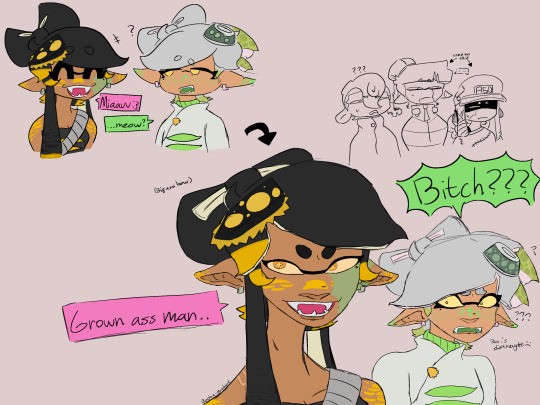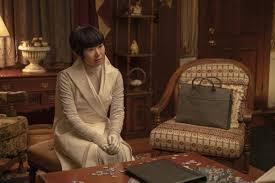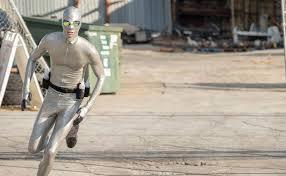#we need more of the Squid Sisters being silly and annoying each other I think
Explore tagged Tumblr posts
Text
Callie this is why you lost your gas station privileges

#splatoon#callie splatoon#callie cuttlefish#marie splatoon#marie cuttlefish#marie kensaki#(Marie and the last name predicament)#goober art#ik some agents are there too#but like….#THIS AINT ABT THEM!!!#we need more of the Squid Sisters being silly and annoying each other I think#bc its fun#also I’ve been thinking abt posting a bit more abt my Sploon OCs#but like..#would anyone even wanna see stuff like that💀💀#idrk#only one way to find out ig#anywho#listen to Hey Rich Boy by Millionaires#do ur daily click#annndddd#have a good#(b^_^)b
103 notes
·
View notes
Text
If You Don’t Like My Story, Write Your Own - Watchmen (TV Series) blog
(SPOILER WARNING: The following is an in-depth critical analysis. if you haven’t seen this episode yet, you may want to before reading this review)

If You Don’t Like My Story, Write Your Own feels like a tale of two episodes. One has well written characters, emotive storytelling and exciting possibilities, whereas the other contains ham-fisted, painfully obvious subtext and annoyingly long infodumps told to the audience with all the grace and subtlety of a brick to the face.
Let’s start with the positives. At the beginning of the episode, we’re introduced to the character of Lady Trieu, played by Hong Chau, who buys a farmhouse from an Oklahoma couple by offering them a genetically engineered baby. I love this scene so much. It’s by far the most tightly written and engaging scene so far this series, and serves as a perfect introduction to a genuinely interesting character.
Lady Trieu is a Vietnamese born trillionaire industrialist who absorbed Adrian Veidt’s company after his disappearance and seems to take heavy inspiration from him, even going so far as to have a gold statue of him in her complex. It’s unclear whether she knows about his involvement with the squid (how could she possibly know?), but she clearly shares his vision of making the world better.
Or... does she?
That’s precisely what I love about this character. Trieu is clearly the secret mastermind behind whatever is going on here (more on that later) and it would have been easy to just simply have her be a carbon copy of Veidt, but she isn’t. There’s a subtle, but clear distinction between the two. In my review of Look Upon My Works, Ye Mighty, I talked about the paradox of a liberal capitalist and how it’s often not enough for Ozymandias to simply save the world. He needs to be seen to be saving the world. He wants something with spectacle in order to appeal to his own vanity. This is true of Trieu as well, except, despite all his flaws, Ozymandias clearly at least wanted to help people, albeit in an incredibly flashy way for his own aggrandisement. Trieu doesn’t even want that. She just wants the attention and the good will.
The opening scene is a perfect illustration of this. Giving that married couple their own DIY baby was one thing, but all the crap with the hourglass and the silly monologue and everything, there was no need for any of that. And lets not forget, she didn’t give this couple a baby out of the goodness of her heart. She did it solely because she wanted their land so she could claim a fallen object from space. The same is true of this Millennium Clock she’s building. I’m pretty sure its purpose isn’t just to tell the time, but that’s not the point. It’s described by her daughter as not the Eighth Wonder of the World, but rather as the First Wonder of the New World. Plus, of course, she is a trillionaire. If she just handed out even a small portion of her vast wealth, it would make a huge difference, but then there would be nothing in it for her. Nothing to gain. Unlike Veidt, Trieu is a character driven by pure cynicism. She has no interest in saving the world, but rather the attention and adoration of the world around her. She wants the world and the people around her to rely on her to save them. Basically if Ozymandias is an altruist tempered with narcissism, then Lady Trieu is a narcissist tempered with altruism. It’s a beautifully realised character and one I’m most excited to see more of in the episodes to come.
I also like the connection she has with Angela. Both were born and raised in Vietnam, except Trieu’s mother was a native to Vietnam before the US invaded and absorbed the country, turning it into the fifty first state. This puts Angela in an interesting position. Being an African American, her family obviously has history of being the victims of colonial oppression, but in this alternate history where Vietnam is part of America, Angela is also now in the role as one of the colonial oppressors. A settler in a country stolen and plundered from the natives. It’s an interesting position for her character to be in and I’m very curious to see where the show takes this.

After taking a backseat in the previous episode, Angela mercifully gets to take the lead again this time around and she’s great. With the FBI breathing down her neck, Angela continues to get to the bottom of the mystery involving her grandfather, the murder of Judd Crawford, and the Seventh Kavalry, and I really like where this is taking her character. She privately confides in Wade about what she has learned, even asking him to hide Judd’s Klan robe. This is the kind of character stuff I wanted to see in the previous episode during the funeral. How do you react to the knowledge that one of your closest friends was a hateful bigot? And from the looks of things, it seems as though Angela is doing her level best to protect Judd’s memory, at least until she gets to the bottom of what the fuck is going on here. I love this because it feels totally believable.There’s still a part of her that doesn’t want to accept Judd’s racist ties to white supremacy and clinging onto the idea that he might be misunderstood or that there’s something else going on underneath. This is an excellent internal conflict that has so far been handled exceptionally well. You don’t think less of Angela for not wanting to accept the truth because it’s totally understandable and believable.
Also I just want to briefly talk about what we learn about Wade, aka Looking Glass, in this episode. The man’s a doomsday prepper, living in a bunker in his back garden, preparing for another squid attack. I LOVE this so much. It makes total sense in the context of Watchmen and, like with Lady Trieu, it serves as a really nice inversion of an existing character. Like Rorschach, Looking Glass is a paranoid conspiracy nut, but unlike Rorschach, there’s actually some truth and logic behind his paranoia. Again, it’s a subtle distinction, but it’s enough to allow the character to go off in his own direction.
Here’s the thing. The bits I like about this episode, I really like. Unfortunately the bits I don’t like, I really don’t like.
Let’s begin with Laurie. What is she even doing here? Not only is she so utterly divorced from the character in the graphic novel, she doesn’t even contribute anything meaningful to the plot, other than to bicker constantly with Angela (which, considering this is the first time in Watchmen that we’ve had two female characters together interacting with each other, it feels immensely disappointing that this is the best the writers can come up with) or to spout gratuitous fanwank and pop psychology. The pop psychology in particular irritates me because it simply doesn’t gel with the tone and themes of Watchmen. I’m really hoping all that stuff about trauma and wearing a mask to hide the pain doesn’t in fact apply to Sister Night, otherwise I’m going to be extremely annoyed. Not only is that cliched beyond belief, it also stands directly against the whole point of Watchmen as a concept. Alan Moore’s intent was to scrutinise the reasons behind why someone would put a costume on and fight crime. Some just want the attention, others want to compensate for their own inadequacies, and some just want to live out their own violent, hedonistic fantasies. Only Rorschach fits the trauma model proposed by Laurie, and even then it’s not really accurate. Rorschach uses his trauma more as an excuse than a motivation. Watchmen serves as a deconstruction and criticism of superhero archetypes, so to potentially give Sister Night an obligatory tragic backstory would feel like a grave disservice to the source material.
The pop psychology also represents another problem this episode has. It seems to spend an awful lot of time telling its audience about its themes and commentaries rather than just showing them. One of the things I loved so much about the second episode was that it respected the audience’s intelligence. The connections it was making between the police and mob psychology, the superhero genre and its roots in US propaganda, and the KKK and the moral absolutism of most comic book heroes were apparent in the episode’s visual language and symbolism. It didn’t try to highlight them in fifty foot high neon lettering, instead trusting the audience to make the connections themselves. Here, however, completely the opposite. At numerous points, it feels as though the episode is sitting me down like a naughty school child and straight up telling me the plot, rather than trust that I’m a grown man who is perfectly capable of following this by himself, I pinky promise.
Take the whole subplot with Adrian Veidt for example. By watching the previous episodes, you can deduce that he’s trapped in a prison of his own making and is trying to escape (although admittedly it turns out that the clones aren’t in fact his creations, which is a pity because I think that’s less interesting, but still). Awesome idea. Love it. But showrunner Damon Lindelof is clearly worried that the idiots sitting at the back of the class didn’t get this, so Adrian spends his limited screen time here just explaining his subplot to the audience. It’s really annoying.
Or what about the Millennium Clock? The Seventh Cavalry are clearly in league with Trieu for some unknown reason, and in their video message to the police in the first episode, they say ‘tick, tock’ a lot, which is clearly a reference to the Clock. All a bit goofy, granted, but do you know what’s even goofier? Will getting up out of his wheelchair, staring dramatically into camera and saying ‘tick, tock’ for no fucking reason whatsoever other than to spell out the connection for the slow people in the audience who didn’t make the link. Dude, I promise you, we are following this. It was just pointless. But not nearly as pointless as...

Good God, do I hate Lube Man!
Don’t get me wrong, I’m not against there being humour in Watchmen. The original graphic novel had moments of dark humour, but there’s a time and a place. It just feels weird and kooky just for the sake of being weird and kooky. And again, it serves as a less than subtle reminder to the audience of the themes of the show. The police are abusing their powers and letting smaller crimes fall by the wayside, but rather than let that come up naturally in the story, we get a random excerpt from the Silver Slider here. All I can say is Lube Man had better play a vital role in the episodes to come, otherwise I’ll be pissed.
See, when Good Lindelof is writing the scripts, I’m enjoying this show immensely. When Bad Lindelof takes a turn at the keyboard, however, that’s when I start to get worried.
#if you don't like my story write your own#watchmen#watchmen hbo#damon lindelof#dc#hbo#review#spoilers
11 notes
·
View notes